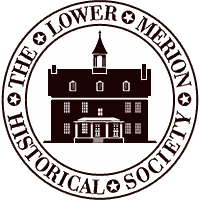Access and Security Policies for Lower Merion Historical Society Collections
The Lower Merion Historical Society (LMHS) is dedicated to ensuring the safety and preservation of its collections. These policies and regulations are in place to safeguard the collections from damage and ensure accessibility to researchers and the public.
The LMHS collection comprises documents, records, maps, and images dating back as far as 1702. Due to the volume of material and the varying conditions of the items, it is crucial for individuals seeking access to adhere to the following policies and guidelines.
Public Access
The Lower Merion Historical Society is open to the public. Operating hours are limited, so please consult the website for current information and to register to visit during visitation hours. Requests for access outside of operating hours will be considered based on the availability of appropriate staffing at the requested time. All researchers will be required to review and agree to the security and protection measures for LMHS before gaining access to the collection.
Lower Merion Historical Society Staff Support
When conducting research at LMHS, there will always be two LMHS staff members on-site. One staff member will remain present in the room with the patron/researcher, while the other will be responsible for retrieving requested items.
Personal Belongings
Individuals should limit the amount of personal property they bring into the research room. While LMHS will make every effort to secure patrons’ personal belongings, staff may request the removal of personal items from the building. Certain prohibited items are not allowed in the research space (see below). Dangerous items or weapons are strictly forbidden, and patrons will be denied entry until such items are secured off-premises. Oversized bags or suitcases are not permitted in the research room at any time. Lockers will be provided outside of the research room for storing personal belongings. LMHS accepts no responsibility for lost or missing personal items.
Allowable Items in the Research Room
The following items are allowed in the LMHS Research Room:
- Pencil and paper
- Laptops, portable computers, and tablets
- Smartphones
Digital photos are permitted, but certain items may have flash restrictions, which will be noted by LMHS staff.
Items Not Allowed in the Research Room
The following items are NOT allowed in the LMHS Research Room:
- Food and beverages of any kind
- Backpacks, handbags, or any other similar item
- Any type of pen, including erasable pens (e.g., FriXion)
- Scissors, craft knives, box cutters, or any other cutting implements
Requesting Materials
Researchers may request items for review by completing a request form and submitting it to the appropriate staff member. Multiple items can be requested, but there is a limit of three items to be reviewed at a time.
To make the most efficient use of your time, we recommend reviewing the items in the LMHS collection in advance of your visit, see our Library Collection and finding aids prepared by the Historical Society of PA.
Appropriate Handling of Materials
Researchers must handle the collections with care. This involves taking the following precautions:
- Use only pencil and paper for taking notes.
- Refrain from eating or drinking in the research room.
- Exercise caution to prevent bending or creasing any items.
- Removing any item from the Research Room is strictly prohibited.
A note on the use of gloves
According to the Library of Congress, the use of gloves is not necessary in handling all archival materials:
Gloves should be worn when handling materials that are marred by the natural oils on skin — this includes photographs and film, metals, ivory — and whenever there is a suspected health hazard (e.g., mold). Wear fitted, clean, lint-free cotton or nitrile gloves when handling photographs and films or directly handling film or tape (e.g., open reel instead of film/tape on a reel or cartridge). Use impermeable gloves if there is reason to suspect a health hazard (e.g., mold). Always handle collection materials with clean hands whether wearing gloves or not.
Though clean gloves prevent the transfer of natural skin oils to paper, they reduce tactile sensitivity and increase clumsiness. Studies have shown that skin oils can affect how paper ages, but some preservation experts prioritize reducing the physical risk from reduced tactility; see “Misperceptions About White Gloves”, (PDF: 192 KB, 14 pages) from International Preservation News.
Thank you for your interest in the collections of the Lower Merion Historical Society.
We also encourage you to consider supporting our work to preserve Lower Merion and Narberth history. The Lower Merion Historical Society is a non-profit organization that relies on the support of its members and donors to continue its work. Your tax-deductible gift will support the stewardship, education, preservation and outreach programs of the Society.
